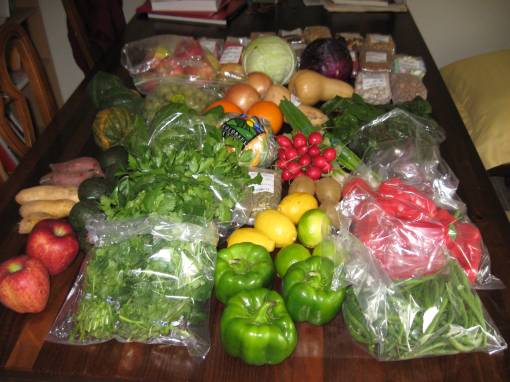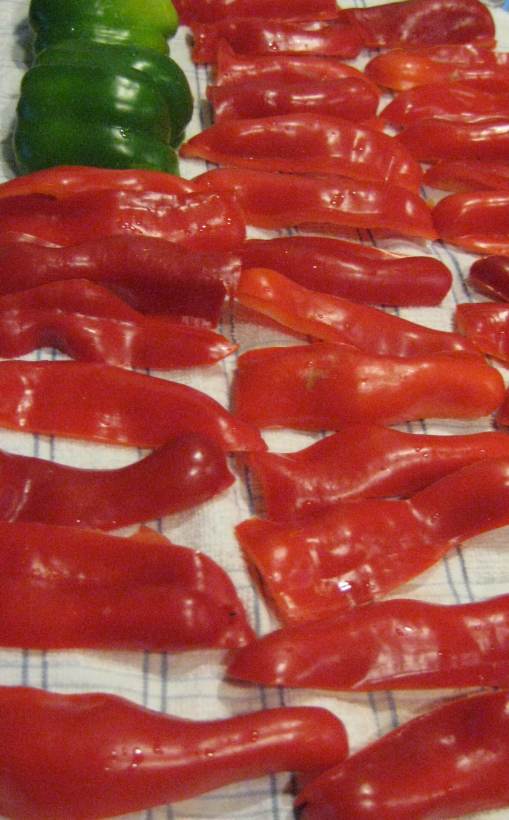The day before Thanksgiving, I stopped at Mike’s Truck Garden (a fruit and vegetable stand in Fulton, CA). I’d seen low prices advertised on local apples the week before, and wasn’t surprised to see the place mobbed the day before the holiday. I picked out some apples and a few winter squash, got up to the cashier and he said “the total is $4.44, which means it’s $2.22 for you today.” And then I understood why the employees were saying “have a good holiday, see you in the spring” to everyone: it was the last day of the season that they were open, and no matter what you purchased that day, the entire bill was half off. Score.
I got in my car, drove around the back, and decided to park again. This time, I brought in my shopping bags and got a cart. I bought many packages of bulk food (nuts, seeds, trail mix, candy for Christmas stockings, etc), more apples and assorted squash, red peppers, green peppers, tomatoes, sweet potatoes, yams, cilantro, parsley, radishes, cauliflower, kiwi, lemons, limes, oranges, onions, green onions, red cabbage, green cabbage, grapes, spinach, green beans, and swiss chard. My total was $80.46, so I paid $40.23.

I would have bought more, but I was mindful of what I could use for Thanksgiving and in the immediate future, and what I could preserve. My instinct (that I had to suppress) was to “rescue” as much of the food as I could. (I think I could be an obsessive harvester/gleaner if I ever have a garden.)
When I got home, I called my mother, and asked her the best freezing method for much of the excess. In my childhood, we had large gardens and numerous fruit trees, and we rarely, if ever, used “store-bought” frozen vegetables or fruit. Every year, we dried culinary herbs, canned tomato sauce, applesauce, and assorted jams/jellies, and stocked the freezer with large quantities of tomatoes, green beans, peas, peppers, corn, peaches, and blueberries. My sister and I were always being sent to the basement to retrieve items from the two massive chest freezers.
 So I spent all of the afternoon before Thanksgiving (and into Thanksgiving day, as well) washing, cutting, and storing vegetables and herbs. In the week and a half since then, my roommate and I have used all the fresh things, and I take pleasure in being able to pull a ziploc full of clean, ready-to-use cilantro from the freezer when making guacamole.
So I spent all of the afternoon before Thanksgiving (and into Thanksgiving day, as well) washing, cutting, and storing vegetables and herbs. In the week and a half since then, my roommate and I have used all the fresh things, and I take pleasure in being able to pull a ziploc full of clean, ready-to-use cilantro from the freezer when making guacamole.
It turns out that it was an exceptional way to honor Thanksgiving. At the most basic level, I am grateful for access to plentiful food and to have the money to purchase it, and for the means to preserve and appreciate it. It also connected me to my family who I was missing over the holiday. My mother sent me the following email late on Thanksgiving eve:
I hope you got all your food “put up”. I was smiling most of the evening thinking about you doing that and enjoying it. It always brings back a warm glow of home and gives such pleasure. Enjoy, enjoy.
Related gleanings: Last week, a story was circulated about 40,000 people showing up at a farm in Colorado to glean the fields after harvest. Also, as most of us are aware, a lot of food banks are low this year. If you have the means, consider donating food, time or money to one near you; a good organization is Feeding America (formerly known as Second Harvest).
